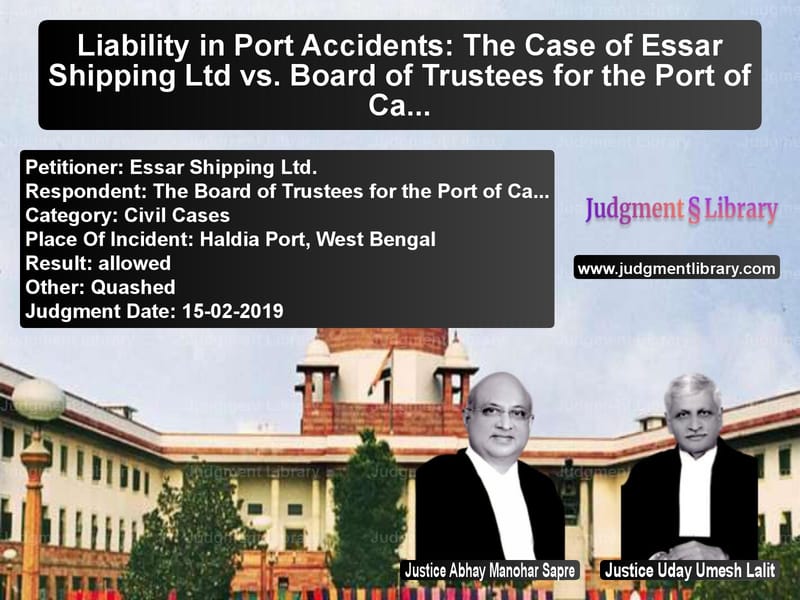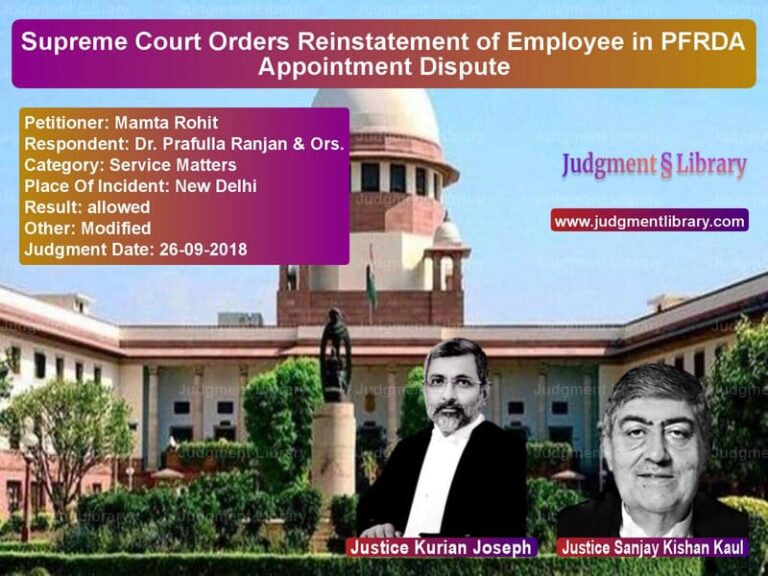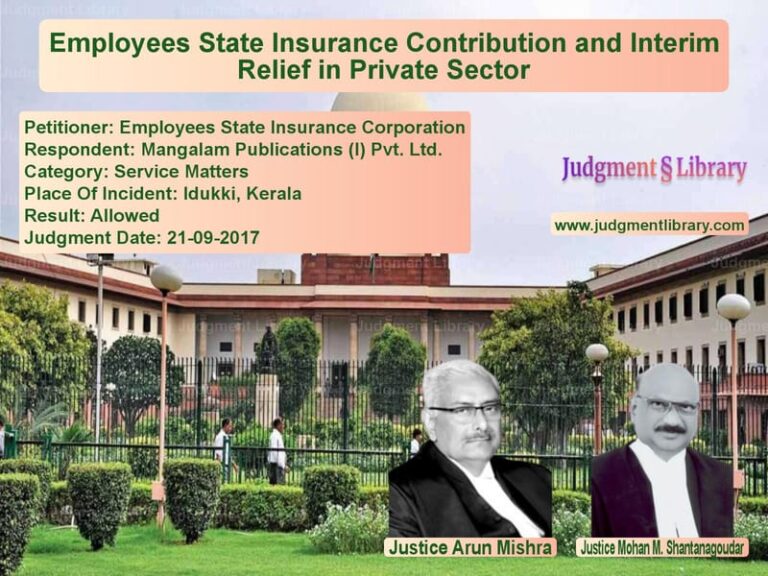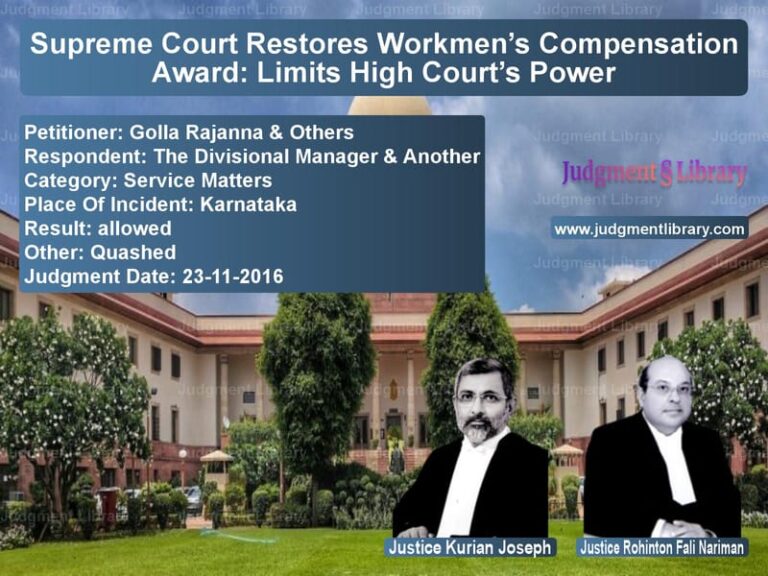Liability in Port Accidents: The Case of Essar Shipping Ltd vs. Board of Trustees for the Port of Calcutta
The case of Essar Shipping Ltd. vs. The Board of Trustees for the Port of Calcutta revolves around the question of liability in an accident involving a cargo vessel at the Haldia Dock. This case highlights key legal principles related to port operations, pilot responsibilities, and the limits of liability under maritime laws.
Essar Shipping Ltd., the owner of the vessel M.V. Chennai Nermai, challenged an order that held them liable for damages caused to a coal loader while berthing at the Haldia Port in 1987. The matter was litigated through various stages before reaching the Supreme Court, which ultimately ruled in favor of Essar Shipping Ltd.
Background of the Case
On August 27, 1987, at approximately 11:48 hours, M.V. Chennai Nermai arrived at the lock gate of Haldia Port for loading coal. The berthing process was conducted under the supervision of a Berthing Master employed by the Calcutta Port Trust. During berthing, the vessel made contact with a coal loader stationed near the dock, causing damage.
The Port Trust immediately issued a notice to the Master of the vessel, holding the vessel liable for the damage. The Master, however, denied responsibility, asserting that the coal loader was not properly positioned. Despite this, the Port Trust sought an acknowledgment of liability before allowing the vessel to leave the dock.
Subsequently, Essar Shipping Ltd. filed a suit challenging the acknowledgment of liability, arguing that it had been obtained under coercion. The trial court ruled in favor of Essar Shipping Ltd., but the decision was overturned by the Calcutta High Court’s Division Bench, which imposed a liability of Rs. 24,04,237 on the shipping company. The matter was then appealed to the Supreme Court.
Arguments by the Petitioner (Essar Shipping Ltd.)
- The vessel was under the control of the Port Trust’s Berthing Master during the berthing process.
- The accident occurred due to the improper positioning of the coal loader, not due to any fault of the vessel’s crew.
- The acknowledgment of liability was obtained under duress, as the vessel was detained for two days before departure.
- The Committee appointed by the Government of India had found that no individual responsibility could be fixed due to a combination of factors.
- The High Court erred in disregarding the findings of the expert committee.
Arguments by the Respondent (Board of Trustees for the Port of Calcutta)
- The vessel’s Master failed to inform the Berthing Master about the vessel’s deballasting, which reduced its draft and increased its exposure to wind.
- The vessel was unmanageable due to strong winds of 24 knots, leading to the collision.
- The responsibility for navigating the vessel safely rested with the Master, not the Berthing Master.
- The acknowledgment of liability was voluntarily provided by the Master of the vessel.
Supreme Court’s Ruling
The Supreme Court examined the factual matrix and ruled in favor of Essar Shipping Ltd., stating:
“Considering the entirety of the matter, we find that the assessment of all the relevant factors was duly considered by the Committee in correct perspective and it cannot be concluded that the acts of commission or omission on part of the Master of the vessel alone were responsible for and resulted in causing the damage to the coal loader.”
- The Berthing Master was responsible for ensuring safe berthing and should have accounted for wind conditions.
- The acknowledgment of liability was obtained under questionable circumstances.
- The Committee’s findings, which attributed the accident to a combination of factors, should have been given due weight.
The Supreme Court set aside the High Court’s order and restored the trial court’s ruling in favor of Essar Shipping Ltd.
Implications of the Judgment
This ruling is significant in clarifying the principles governing liability in maritime accidents. The key takeaways include:
- Responsibilities of Port Authorities: Ports must ensure proper communication and positioning of equipment to avoid accidents.
- Burden of Proof in Maritime Disputes: Mere acknowledgment of liability does not establish fault if obtained under duress.
- Judicial Review of Expert Findings: Courts should give due weight to the findings of expert committees in technical matters.
In conclusion, this judgment reinforces the need for clarity in liability allocation in port operations and ensures that shipowners are not unfairly held responsible for accidents caused by multiple factors beyond their control.
Petitioner Name: Essar Shipping Ltd..Respondent Name: The Board of Trustees for the Port of Calcutta.Judgment By: Justice Abhay Manohar Sapre, Justice Uday Umesh Lalit.Place Of Incident: Haldia Port, West Bengal.Judgment Date: 15-02-2019.
Don’t miss out on the full details! Download the complete judgment in PDF format below and gain valuable insights instantly!
Download Judgment: Essar Shipping Ltd. vs The Board of Trustee Supreme Court of India Judgment Dated 15-02-2019.pdf
Direct Downlaod Judgment: Direct downlaod this Judgment
See all petitions in Contract Disputes
See all petitions in Property Disputes
See all petitions in Judgment by Abhay Manohar Sapre
See all petitions in Judgment by Uday Umesh Lalit
See all petitions in allowed
See all petitions in Quashed
See all petitions in supreme court of India judgments February 2019
See all petitions in 2019 judgments
See all posts in Civil Cases Category
See all allowed petitions in Civil Cases Category
See all Dismissed petitions in Civil Cases Category
See all partially allowed petitions in Civil Cases Category







